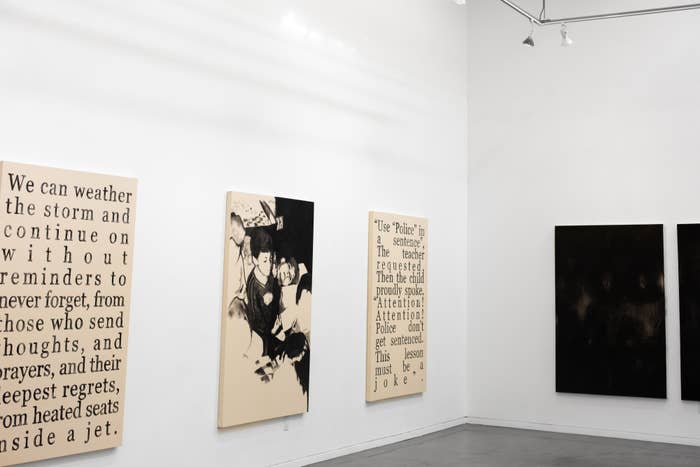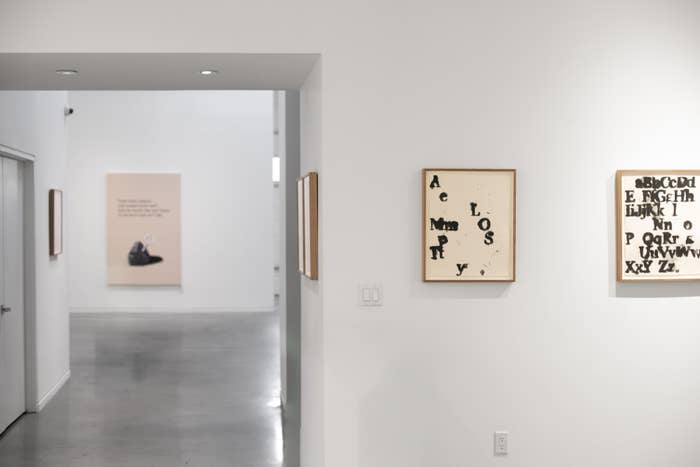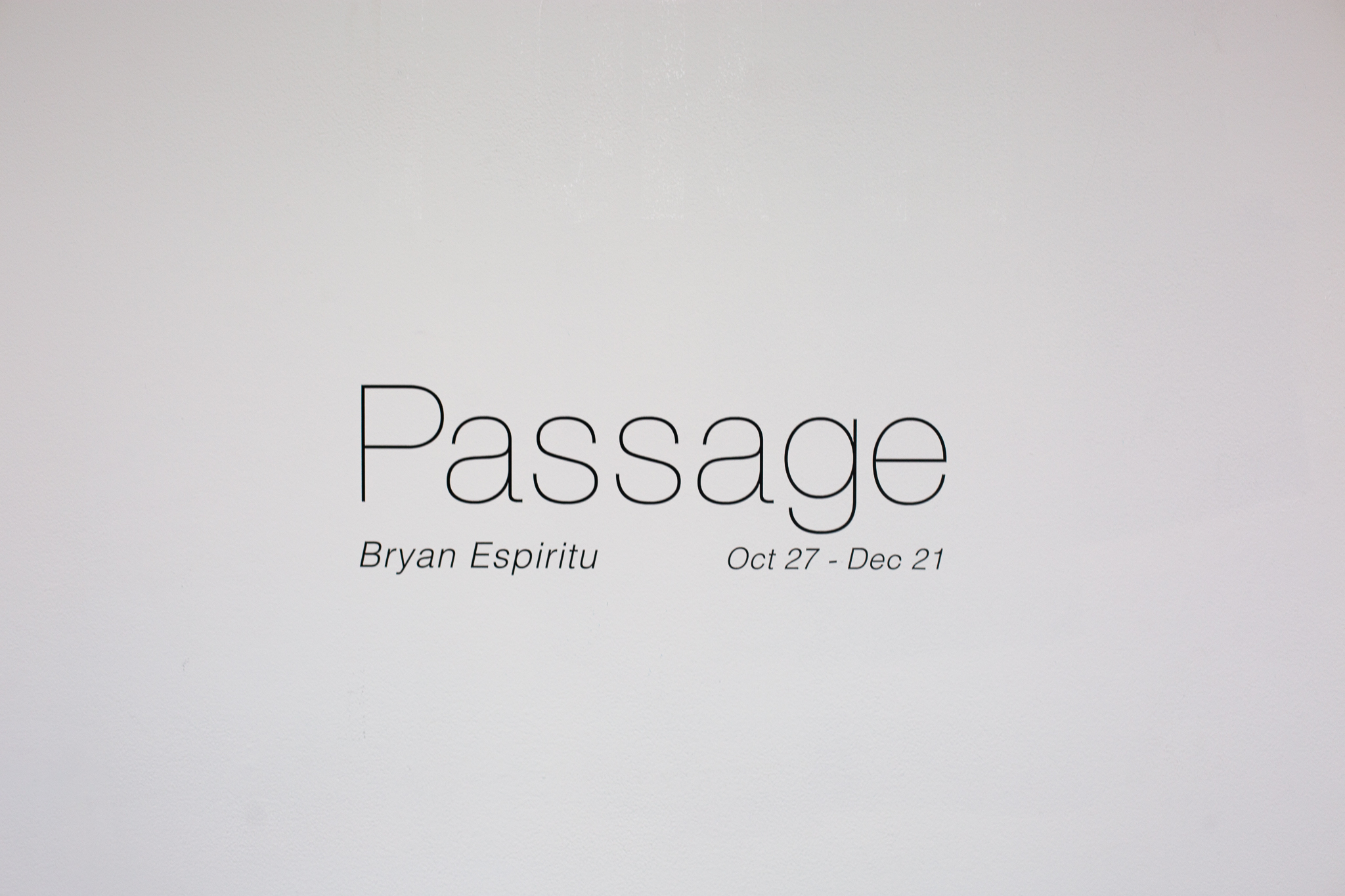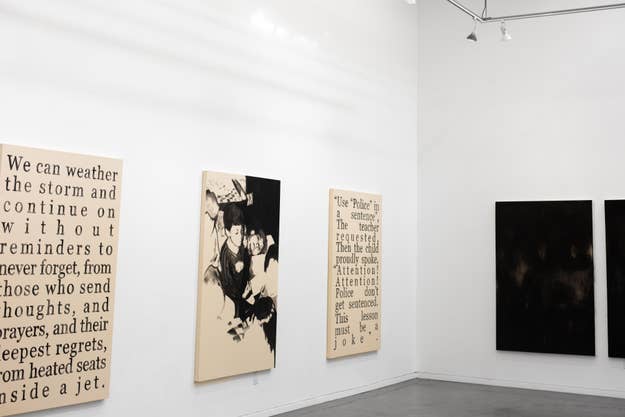
There aren’t many names more regarded in the Toronto creative scene than Bryan Espiritu.
The Legends League founder put his iconic brand to bed, with only the occasional archive drop to satisfy fans. But that doesn’t mean Espiritu isn’t working hard. After over a decade since his last exhibit, Espiritu has returned to the art world for his newest project Passage at Cultural Goods Gallery in Toronto until Dec. 21.
Even when he was conquering fashion, Espiritu has remained an artist, writer, and poet at heart, and Passage is a project that cuts close. It talks about childhood trauma, becoming an adult, and being free to express yourself in a way that maybe you can’t in every day life.
Complex Canada caught up with Bryan Espiritu to talk about Passage, why it’s his least Toronto-centric project yet, and why he had to walk away from Legends League.
This is your first exhibit in a long time. Tell me about the journey to get there.
Art and creativity, as cliche as it sounds, has been a part of my life forever since it was a child. Taking a hiatus between the exhibit that I did 12 years ago and this one I think had a lot to do with being able to grow and land in the person that I am, and make sure that the creative work that I was doing was matching who I was as an individual and as an adult. I didn't want my next exhibit to be something that was playing to the crowd or doing what I felt other people wanted to see out of me. I wanted to be able to find my voice and find my visual language in order to create work that matched where I'm at as a human.

How does this new work serve you?
The biggest difference is the feeling like I'm not fighting my way out of struggle. I’m not fighting my way out of pain. I'm not necessarily using my creativity as a means to get out of something. Right now, the way that this is serving me is landing in a place where I think that I’ve afforded an opportunity to have a voice and a platform that could potentially echo the struggles and traumas of other people as well.
That's why a lot of the writing isn't so specific. It's quite broad. The way that this is serving me is almost like I've been able to elevate above the maze and see it from 30 thousand feet and realize maybe I was trying to get out of something. I can't necessarily find the exit, but all I needed was to be able to elevate above it.
I think being able to write about some of those experiences and write about some of that pain and put it in the artwork has potentially allowed others to look at the work and see that I’m echoing the way that they feel. And that's probably the biggest response I got from opening night. Even though our experiences are unique, they're not uncommon.
"Unfortunately at some point Legends League was something that I felt I was doing for the people."
What’s the overall theme of 'Passage'?
From when I was very young, I wanted to write. Language in this setting, I wanted to be able to put the words in the forefront. Because writing has always been the most important aspect to my creativity, even in the way that I designed, even for Legends League. I didn't want to hide behind that anymore. I didn't want it to be camouflaged. Putting it forward was very intentional. A picture can paint a thousand words, but if I provide the words, people can interpret it in the way that they need.
Thematically, it’s based on difficult childhood experiences, and trauma, and how adults rationalize. I think it's important, especially as a man of colour and a queer man of colour, there needs to be an ability for people to look at work and say: ‘this individual is not afraid to speak about being a child who's experienced trauma, and an adult who can make sense of what that space is between those things.' It's a voice I feel I don’t always have in real life, I’d rather talk with my hands.

You’re a consummate Toronto creative. People are attached to what you bring as a Toronto creative. How is this project still linked to Toronto? Or is it?
I think that I needed it to not be a localized project. I needed it to be a global experience, and there's something that is borderless about pain, there's something borderless about human experience. There is one nod to Toronto that I purposely put into the exhibit. But for the most part, I wanted something that spoke of human experience, and not just localized experience. A lot of the writing happened in Los Angeles and Miami. I needed to be away from here. I didn’t want to play the greatest hits. This was the bravery to decide to play the new stuff.
What went into the decision to end The Legends League?
Legends League came about in 2006, it was like a lifetime ago. And it was led by my writing. It started as a blog. It started as a means for me to be able to write about my experiences. And so it's not unlike the work that we're in the middle of right now, in terms of this stuff being language forward. The big difference was Legends League was a means for me to express myself, but also, a means for me to make a living. We opened a shop in 2015, we had multiple employees, collaborations, and projects that we were doing. But it was very much based on a version of me that was younger. I was in a separate place, mentally and visually, in terms of what my aspirations were creatively and my aspirations for my life.
And I felt if I had stayed doing LL and had wanted to explore what my artwork could look like, it would just have been two separate paths that I don't think could have coexisted in a way where both of them felt like they were serving a purpose that was true to me. And I don't think that this particular exhibit would have been consumed in a way that I needed people to be able to consume it if their outlook was still what I was doing with Legends League. Unfortunately at some point Legends League was something that I felt I was doing for the people who needed it and wanted it, and it wasn't serving me at the moment. That’s why I decided to put it to rest. And that wasn't a popular decision, man. There were a lot of people who were like, ‘man, it's a money driver, you got a lot of support.’ But at the end of the day, I had to lead with happiness. If one day I decide to revive it, I will, but right now there are so many other brands that are doing their thing. I didn’t want to be on the court, half-assed.


